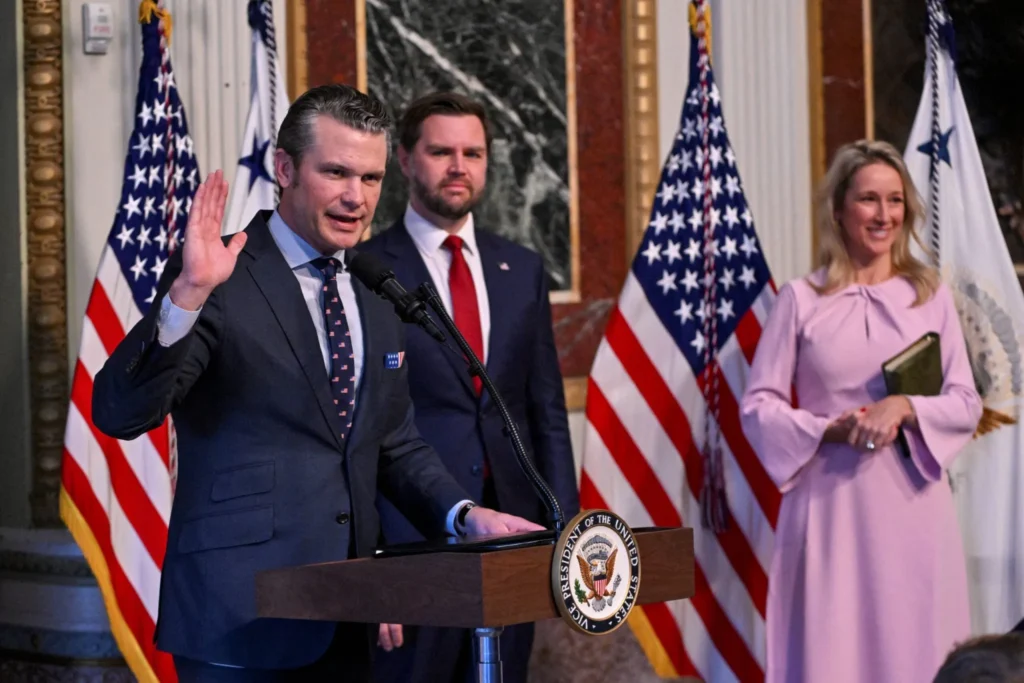Have you ever wondered how a simple mistake could spiral into an international sensation? This is exactly what happened in the curious case of a top official in Trump’s administration inadvertently texting war plans to a journalist. The situation combines the drama of a political thriller with the digital mishaps we all dread. Let’s unravel this viral tale, looking closely at the implications and the reactions it stirred.
Understanding the Accidental Revelation
The incident unfolded when a high-ranking official in Trump’s administration, apparently unfamiliar with the nuances of digital communication, mistakenly included Jeffrey Goldberg, the editor-in-chief of The Atlantic, in a group chat. This wasn’t just any group chat; it was one where the U.S. plans to strike military targets in Yemen were being discussed. The conflict in Yemen, in particular the tensions with the Houthis, has disrupted global trade and provoked significant international concern.
The Context: Yemen and Global Trade
Yemen has been a hotspot of conflict for several years, largely due to the activities of the Houthis. This group has posed a threat to global trade by targeting ships that pass through critical waterways. The strategic importance of these routes means that any disruption could affect markets worldwide. Hence, plans to counteract these threats hold significant weight and are usually discussed behind closed, secure doors.
The Technology That Changed the Game
The communication happened on Signal, an encrypted messaging app known for its security features. Ironically, it was the app’s convenience in creating group chats that led to this digital faux pas. Amid rapidly flowing discussions, the addition of one unintended participant turned into a monumental oversight, rather than a convenient way of sharing information across distances.
The Magnitude of the Blunder
Realizing the gravity of this mistake, questions naturally arose about the extent of the breach. Discussions that should never see the light outside secure room environments were inadvertently opened to a journalist. This alone constitutes a major protocol violation, with potential legal repercussions under the Espionage Act—a crucial point for anyone managing sensitive information.
Breaches and Protocols: What Went Wrong?
One might ask, how could such a serious discussion land in a casual group chat? The breach underlines a severe lapse in judgment where security measures were bypassed for simplicity. Discussions of this nature typically require highly secure environments, like SCIFs (Sensitive Compartmented Information Facilities), where digital communication devices are strictly prohibited.
Legal Implications and the Espionage Act
The Espionage Act is a formidable piece of legislation. It lays down strict guidelines to prevent the unauthorized dissemination of sensitive information. While national security adviser Michael Waltz, who purportedly added Goldberg to the chat, may be scrutinized under these guidelines, it remains unclear whether there will be any serious legal fallout.
Global Reactions and Diplomatic Ripples
The revelation didn’t just cause a domestic stir; it sent ripples across the international community, particularly among European allies. Many of these countries were already cautious of Trump’s administration, citing concerns over its cozy relations with Russia and tension with NATO. This latest episode only compounded existing trust issues.
Allies’ Concerns: Trust on Tenterhooks
For allies, sharing sensitive information with Trump’s administration has become a gamble. This incident highlights vulnerabilities that could potentially compromise joint operations or strategic interests. It’s a delicate balance where diplomatic relations hinge on unquestionable trust, something that feels ever so precarious now.
The Role of the Media in National Security
Journalists often walk a fine line between reporting the truth and safeguarding national interest. In this case, Jeffrey Goldberg demonstrated discretion by not disclosing every minute detail of the conversations. This raises interesting discussions about the responsibilities media outlets have in protecting national security, even as they strive to inform the public.
Learning from Mistakes: Security in the Digital Age
In today’s hyper-connected world, the importance of cybersecurity cannot be overstated. While individuals may still grapple with the basics of using email, such mishaps at top governmental levels could have far-reaching consequences. This incident is a poignant reminder to re-evaluate how sensitive information is handled digitally.
Enhancing Digital Literacy Among Officials
This situation underscores a glaring need for digital literacy and cybersecurity training among officials who manage critical operations. Understanding the tools at their disposal—not just their conveniences but also their risks—is essential in preventing such slip-ups.
Technology as an Ally, Not an Adversary
While technology played a central role in this drama, it is also the very thing that can empower secure communication. Proper use of encryption, secure messaging platforms, and diligent adherence to communication protocols can protect against unwanted leaks. The key lies in educating and creating robust digital infrastructures that support, rather than detract from, secure governance.
Reflections on the Incident
As with any story that goes viral, there is much to ponder about its impact and the broader lessons it offers. In politics, where confidentiality is often paramount, the accidental dissemination of information can lead to unforeseen consequences. This incident, blending elements of human fallibility with technology, offers much food for thought.
A Story of Human Error
Ultimately, this incident is a classic tale of human error—a reminder of our collective capacity for making mistakes, regardless of our level of authority. It shows that no one is immune to the slip-ups that technology can amplify in today’s world.
Moving Forward with Caution and Care
For the Trump administration and others holding sensitive positions, this episode is a sobering lesson in the importance of caution. Handling information with care, whether in physical or digital form, remains a critical aspect of leadership and governance.
Conclusion
Our story, a blend of digital oversight and sensitive political maneuvering, reminds us of the complex interplay between technology and security. It asks us to consider how we can prevent similar incidents, ensuring that officials are better prepared and more discerning in their digital interactions. While the specifics might fade over time, the importance of vigilance in our high-paced, interconnected world will always resonate.
By reflecting on these moments with thoughtfulness and a touch of humor, perhaps we can all avoid our next digital faux pas, whether we’re managing global secrets or just ensuring the groceries make it to our online cart without incident.

